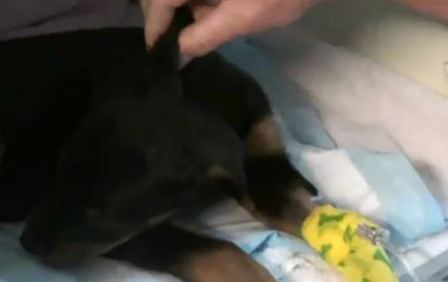Viruses: Parvo Treatment
Virus Quicklinks
Clinical Symptoms
Most dogs with parvo virus infection may appear asymptomatic (showing
no canine parvo symptoms), but when stressed (e.g. boarding, running,
pining, and grief etc.), the stress itself may trigger clinical
features of the disease. Parvo in puppies may result in the appearance
of severe symptoms, with the disease possibly causing death. The
severity of clinical symptoms is also dependent upon the exposure to
the virus, i.e. duration and mode of contact with the infected dog and
the ingested dose of virus through direct or indirect transmission.

Puppy Parvo Patient with IV drip in paw. You can check if puppy is dehydrated by pressing skin up in a fold. If it stays up, it means the puppy or dog is dehydrated. Other signs of illness are sunken eyes.
Source: Dr. Greg DVM
There are two clinical forms of parvo virus in dogs, gastroenteritis and myocarditis ( inflammation of the myocardium which is the middle layer of the heart wall). Young puppies are more prone to both of the forms, but due to recent developments in research and standardized immunization, chances of the clinical form of myocarditis have significantly reduced. It is noted that clinical myocarditis due to parvo virus in dogs is not seen that often.
Gastroenteritis is more common in puppies, usually of age 6 – 20 weeks. Due to the puppy’s age, their immune status is not as developed, making it difficult for the body to protect itself against infections such as puppy parvo. Similarly, male dogs are more prone to infection, since they freely roam around. Parvo virus in dogs causes clinical symptoms such as as anorexia (loss of appetite), vomiting, fever, lethargy and bloody diarrhea. Feces contain excessive quantities of mucus and blood and nutrient absorption is badly affected. Other complications related to the condition are pulmonary edema (accumulation of fluids in chest and lungs) and alveolitis (particular inflammation of alveoli in lungs).
Helpful Video Overview on Puppy Parvo Treatment
Treatment of Parvo Virus in Dogs
There is no specific treatment available to eliminate parvo virus in dogs. Supportive care is the only way to restore body condition. Most dogs recover by restoring and maintaining fluid balance. Fluids should be administered orally if the patient is not exhibiting signs of vomiting. Dogs with a severe infection and vomiting should never be administered any solids or liquids orally. For these dogs, fluids and electrolytes should be administered intravenously along anti-emetic (for vomiting) and anti-diarrheal drugs, which involves a veterinary stay and an I.V. drip. This approach has been proven to be very effective.
Secondary infections are common, but antibiotics are strictly prohibited for dehydrated dogs. These should only be administered on prescription and after the dog recovers from earlier dehydration. Ampicillin, Cephalosporin along with aminoglycosides is considered treatment of choice for dogs with bacteremia and septicemia.
Since parvo virus in dogs cannot be specifically treated, earlier supportive care is only way to save life of patient, therefore it is always recommended that along with fluid therapy, natural remedies and herbal extracts should be used in priority. These extracts are not only safe, but also enhances recovery rate; which is key towards successful treatment of parvo virus in dogs.
Parvo Prevention & Control:
To prevent reinfection and the spread of the virus to other dogs, the dogs environment should be thoroughly disinfected. This includes washing all bedding and items such as dishes. Household bleach with a dilution of 1:30 of bleach to tap water is a very good in-activator of the virus.
Not every dog when exposed with contract canine parvo. Factors include overall health, weather (dry, cold), the strength of the virus and if the dog is stressed, Additional measures, such as the regular administration of supportive remedies to dogs at risk can enhance immunity and reduces the chance of clinical infection.
In terms of natural homeopathic parvo remedies, suggestions include (click links for clinical support):- Parvo–K: A homeopathic, natural formulation of the parvo vaccine plus other helpful ingredients such as Zinigiber, Arsenicum (digestive support) and Belladonna (temperature and fluid balance.
- Immunity and Liver Support: Helps the immune system with support from ingredients such as Dandelion (improves liver and digestion), echinacea (immune system function), Ashwaganada (blood support) and milk thistle.
- Runi Poo Relief: To help firm stools with ingredients such as Lady's Mantle (firm stools and bowel function), Plantain (promotes digestive health) and Podophyllum (digestive support)
- Energy Tonic: For stamina and fitness during and after recovery with ingredients such as Eleuthero (endurance), Rosemary (circulation), Spirulina (nutrition/chlorophyll) and Amalaki (energy).
Vaccination is the best approach for parvo virus prevention. Vaccination against parvo virus should begin at age 4 – 6 weeks, with the last vaccination administered at age 15 – 20 weeks. An annual booster vaccination is required for complete disease prevention.
There is no simple parvo cure. The key is to see a veterinarian who will monitor your dog and help to control symptoms during parvo recovery. This will include steps such as restoring fluid balance and providing medications that can help prevent fluid loss from diarrhea and vomiting. Once these are brought under control, the parvo virus for dogs treatment plan can include improvements in the dog's diet and the use of natural parvo remedies and supplements to further support the immune system.
|
|